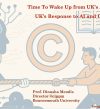Tuesday 28 May 2024, 12:00 (BST); Room F201
The event is free to attend, but registration is required. Please e-mail Professor Dinusha Mendis at dmendis@bournemouth.ac.uk to book your place.
Abstract
Game cloning is a practice by which a competitor seeks to capitalise on a videogame’s success by replicating its combination of game mechanics (i.e. the rules and systems that govern the player’s interactions with the game) without any direct copying of the game’s art, music, sounds or underlying computer program. This allows the competitor to produce a game that ‘plays’ like the original, but looks and sounds different from it. The issue has become increasingly salient both for developers of ‘hyper-casual’ mobile games and big-budget ‘Triple A’ titles. However, the rightholder in the original game may find it difficult to show that game cloning amounts to copyright infringement, due to the challenges of establishing that the copying of game mechanics constitutes the copying of the game’s ‘expression’ rather than merely its unprotectable ‘idea’. Because of this, there are increasing calls for copyright law to be reformed so as to be capable of catching game cloning within the scope of infringement. While these arguments are not without their merits, this paper sounds a cautionary note and warns that such proposals may have a significant negative impact on videogame developers’ creative freedom unless they are framed very carefully and precisely so as to avoid overreach. This, the paper suggests, is difficult to accomplish in the current environment, given the iterative nature of the videogame development and given that copyright law has yet to develop an adequate vocabulary for articulating the similarities and differences in gameplay at the necessary level of detail and precision.
Dr Yin Harn Lee is a Senior Lecturer in Law at the University of Bristol. Her research interests lie primarily in intellectual property law, and in particular copyright law. A significant part of her research focuses on copyright law and videogames, and she has written on issues such as videogame modding, game cloning and videogame preservation. Most recently, she co-authored a study for the World Intellectual Property Organization on copyright infringement in the videogame industry, and a study on IP and the Metaverse for the UK Intellectual Property Office. She is a co-editor of the Interactive Entertainment Law Review. She is also interested in copyright history and doctrine and private law remedies.





